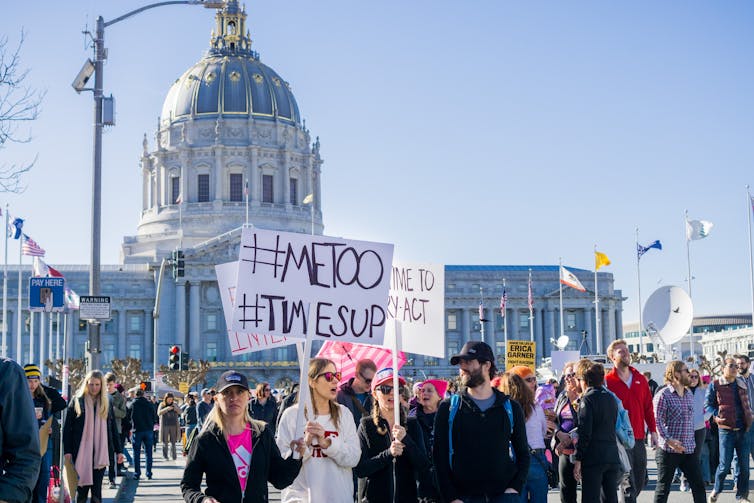Former U.S. President Donald Trump has faced dozens of sexual misconduct allegations over the decades. He’s the first president to be held liable for sexual assault, and in January, he was ordered to pay over US$80 million to E. Jean Carroll for defamatory statements related to her sexual assault claims.
Despite all this, many of Trump’s supporters anticipate his history of sexual misconduct will not hurt his chances for re-election. Some even believe he is a victim of the allegations. Alabama Senator Tommy Tuberville went so far as to say the sexual assault verdict made him “want to vote for him twice.”
In contrast, Carroll stated under oath that she has experienced “almost an endless stream of people repeating what Donald Trump said — that I was a liar, I was in it for the money, I can’t wait for the payout…that I was too ugly to go on living.” In addition to the barrage of online trolling, she also received death threats and was driven from her home.

These outcomes are consistent with prior research that has found most men accused of sexual misconduct rarely experience career setbacks such as transfers or terminations. In contrast, women who report such incidents often face significant consequences, including job loss, involuntary transfers or ostracism.
In our recent research paper, we sought to understand why alleged perpetrators of sexual assault often escape repercussions while their accusers incur intense backlash in organizations.
Responses to sexual misconduct
Across five studies using real-world stories from organizations, social media responses to #MeToo claims, and experiments, we examined how third parties — people who learn of sexual misconduct claims but are not directly involved — respond to sexual misconduct accusations across several industries.
Our research found third parties tend to evaluate individuals involved in sexual misconduct claims based on their moral values as outlined by moral foundations theory.
This theory argues there are five global moral values: alleviating suffering (care), promoting equity and equality (fairness), being loyal and devoted to your groups (loyalty), showing deference to those in power (authority), and practising physical and spiritual cleanliness (purity).
Research has found that people value the five moral foundations to differing extents. Some people tend to care more about the foundations of respect for authority, loyalty and purity, while others tend to emphasize care and fairness.

People who highly value respect for authority, loyalty and purity tend to view behaviour that threatens the stability of groups and institutions as immoral. We build on this to suggest that sexual misconduct allegations against men in positions of authority could be offensive to those who endorse these values.
Our research indicates that moral concerns about loyalty, authority and purity can give rise to ‘himpathy’ — a term coined by philosopher Kate Manne that describes the excessive sympathy directed toward alleged male perpetrators and the anger directed toward accusing female victims.
Moral drivers of ‘himpathy’
In a study of 4,000 tweets from the #MeToo movement, we found tweets containing words related to authority, loyalty and purity were more likely to express sympathy toward alleged perpetrators and anger toward accusing victims.
We also found a similar pattern in stories people shared about witnessing or hearing about workplace sexual harassment. People who valued loyalty, authority and purity were more likely to feel sympathetic toward the person accused and angry toward the accuser.
Our studies showed that himpathy negatively impacts judgements about credibility and results in motivations to resolve injustice in favour of the perpetrator rather than the victim. This ultimately leads to a reduced inclination to punish the alleged perpetrator and a greater willingness to penalize the accusing victim.

These moral concerns seem to flip the expected narrative on its head: when people care a lot about authority, loyalty and purity, they are more likely to construe the accused as the victim and his accuser as the villain.
Our findings suggest that a small yet influential subset of employees is prone to hostile moral reactions toward victims, which might motivate them to protect perpetrators and potentially allow for misconduct to continue.
What leaders can do
Although himpathy will likely continue to occur in political arenas and organizations, there are steps managers and leaders can take to prevent himpathy from protecting perpetrators and causing additional harm to victims.
In one of the experiments in our study, we found that leaders can contribute to increased backlash against victims when they question the victim’s morality in front of their co-workers who strongly value loyalty, authority, and purity. Thus, we recommend managers remain as neutral as possible to avoid facilitating premature, inequitable social consequences for either party involved in a sexual assault claim.
We further encourage organizations to hire third-party investigators not emotionally connected to the case. If this isn’t possible, leaders can build impartial investigative committees with employees holding diverse perspectives and values, which would help prevent anyone who may feel sympathetic to the accused from overly influencing disciplinary decisions.
Once an investigation has taken place, the appropriate actions can and should be taken. In doing so, organizations can reduce backlash toward victims who come forward, like Carroll, and ensure appropriate actions are taken when misconduct occurs.

